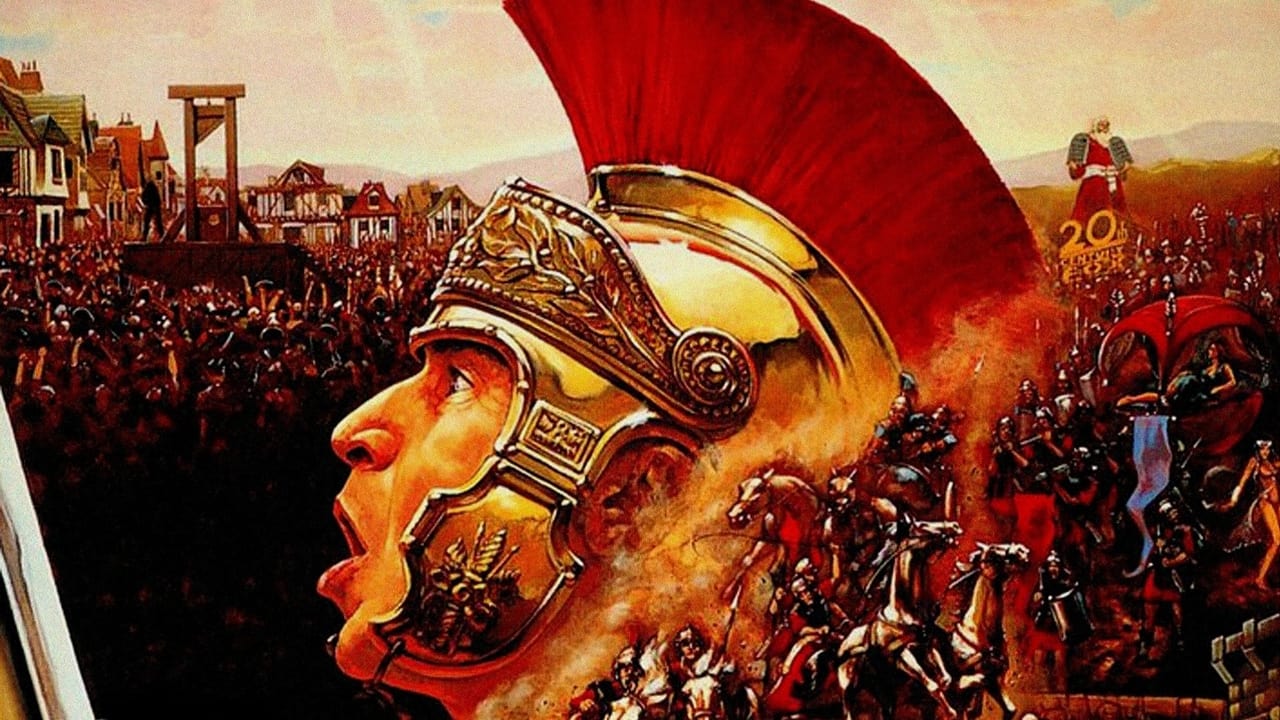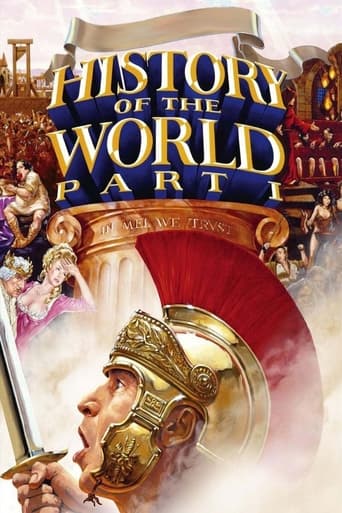

History of the World: Part I (1981) ** (out of 4)Mel Brooks wrote, directed and plays five different roles in his spoof of various historical events and places. We learn about the Roman Emperor, what was really going on at The Last Supper, the build up to the French revolution and we even get to see the earliest days when apes became men.HISTORY OF THE WORLD: PART 1 turned out to be another hit for Brooks and it's certainly held a good following over the years but to me it was the director's weakest film up to this point. If you look at this movie from a technical point of view then it very well might be the best thing the director ever did. With that said, if you're coming to this picture as a comedy, which I'm sure most people are, then they're bound to be disappointed because there are very few laughs.What keeps the film moving is the fact that it looks terrific. The film had a budget over ten-million dollars, which was a lot at the time and especially for a comedy. There's no question that everything is up there on the screen because the various locations looks terrific. This was especially true for the stuff dealing with the Roman days. Even the spoof on Kubrick's 2001 looked fantastic. You can see why the budget was higher than your typical comedy and the great look of the film is the best thing about it.With that being said, I really didn't think there were too many laughs here. In fact, I really didn't laugh but maybe two or three times early on. One example would be them showing the first marriage with a caveman knocking a cavewoman over the head. Brooks appears throughout the film and does a decent enough of a job but there's just not too much for him to work with. I think the idea of the film was probably a lot better in his mind than it turned out on screen.I will add that Orson Welles and that wonderful voice of his does a fine job with the narration. HISTORY OF THE WORLD: PART 1 just doesn't have enough laughs to make it worthwhile.
... View MoreAnother great film from the humorous world views of Mel Brooks. This film is a skit comedy. Skits that give us funny and twisted snapshots of world history that most of us are familiar with.With Brooks' film, you can see the comical side of "well history may have happened this way". Who knows; I'm sure the people in our history books may have had some funny accidents like falling off their chair (a la America's Funniest Home Videos) or some other comical moment in their life. Looking at it like this gives Brooks' film a bit more humor and maybe a bit more realistic view of the famous people from history that is painted having no humorous follies. Remember they were only humans after all so "happy accidents" and funny moments could have really occurred to them.8.5/10
... View MoreComic perspective is usually determined in the opening moments of a funny movie, establishing the rules of the new world and hooking the audience. Well, History of the World Part I begins with cavemen waking up and humping air for what feels like a solid 2 minutes. This is his Dawn of Man segment, a vague parody of Kubrick's 2001, before he moves on to The Stone Age during which the first art critic is sent up, and then mocks Moses in an Old Testament sketch, which is essentially a single joke that we fade into and out of that quickly. Where Brooks really goes to town is during The Roman Empire. He stars as a "stand-up philosopher" who, along with a black slave played by Gregory Hines and a defiant vestal virgin, brings pandemonium to the court of the extraordinarily hilarious Emperor Nero, in one of Dom DeLuise's most memorable performances, and Madeleine Kahn, his nymphomaniac empress.We're actually surprised when the movie moves on, because it seems to have decided to develop some semblance of a story there, unlike its preceding episodes. But it does, and Brooks again takes center stage as Torquemada, who celebrates his ecstatic pleasure in torturing Jews who reject Christianity in a Busby Berkeley tableau abounding with melody, singing, and a water ballet. Oh, and a funny little aside elucidates some unanswered questions about how Leonardo Da Vinci painted the Last Supper. Ultimately, Harvey Korman steals the spotlight from Brooks, as per usual, in an absurd caricature of The French Revolution. Korman plays foppish nobleman Count De Monet, who turns up with a cunning plot to save King Louis XVI from death at the hands of the mob by switching the King's lowly doppelganger on the crucial occasion.This is an incoherent, disorderly, sometimes awkward romp by one of the most talented comic filmmakers, who never seems to have a clear idea of the underlying principle of his seventh film escapade, so there's no assertive narrative incentive to bear it along. His historical context doesn't have any method or perspective. It's basically just an assembly line for whatever jokes he can sling on it. What is this off-the-wall grab bag? Is it a lampoon of old Biblical, Roman and French historical epics? From time to time. Is it a never-to-be-repeated, comedy vaudeville seizure? Now and then. Is it a send-up trained at haughty foils? Every so often. But generally it's in essence simply valuable sets standing there expecting Brooks to do something comical before them.Synchronously with Woody Allen, Brooks has helped sustain the comedy genre in contemporary films. As Allen has turned increasingly sophisticated and contemplative, Brooks has gotten increasingly campy and preposterous, the politically incorrect auteur and effortless ham actor's rudimentary oomph let loose flat out with this outrageous 1981 package picture, in which---rather than taking razor-sharp bites out of status quo mythologies and nostalgic legends as he did with his crowning achievements Blazing Saddles and Young Frankenstein---he indulges in our incessant need for mocking the sort of unconsciously class-based theories of manners and good form that inadvertently made burlesque all the rage in its puritan heyday. As in all movies by the ambitious Brooks, there are dull patches where the farce and the gags just don't work. But hit-or-miss is his style, so when he does hit, he hits the bullseye. Or at least somewhere in the red or yellow.
... View MoreI saw this movie at the cinema in 1983, when I was 16 years old. Actually, most of my school mates saw it as well, and we couldn't talk about anything else: It was an extremely funny and hilarious movie! Every single detail caused us to crack up, from the monkeys at the beginning to the Jews at the end.Now, I've just got to see it again on DVD. I was very enthusiastic about it but... Meh! One and a half hours wasted in my life. I barely could stand it. The gags resulted so dumb to me.I don't want to rate this movie because I'll be unfair for sure. It's just a matter of perspective: For a 16-year old in 1983, it's a really funny movie. For a 43-year old in 2010, it is certainly not. : = (For comedies that have stood the test of time (off the top of my head), check "Top Secret!", Steve Martin's "All Of Me" and the French "Les Sous-Doués Passent Le Bac".
... View More